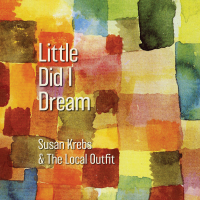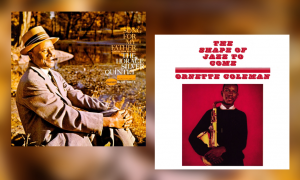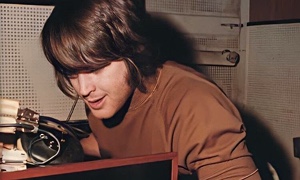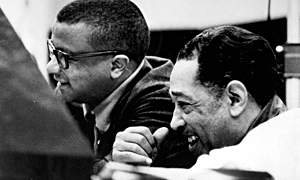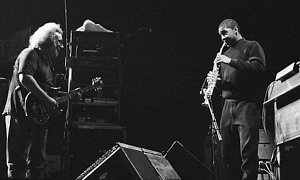Home » Jazz Articles » Building a Jazz Library » From George Coleman to Meeco: Ten Overlooked Classics
From George Coleman to Meeco: Ten Overlooked Classics

Alessandro Meroli
saxophone, alto
George Coleman
saxophone, tenorb.1935

Svein Finnerud
piano1945 - 2000

Howard McGhee
trumpet1918 - 1987

Dudu Pukwana
saxophoneb.1938

Zoe Rahman
piano
Idris Rahman
saxophone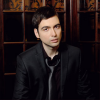
Meeco
composer / conductorb.1976

Michel Legrand
piano1932 - 2019

Nicola Conte
multi-instrumentalist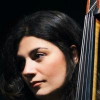
Ilaria Capalbo
bass, acousticb.1984
 Meeco
Meeco Beauty Of The Night
Connector
2012
Berlin-based composer/producer Meeco and his singular satin jazz share approximate bearings with two other artists. One is

Antonio Carlos Jobim
piano1927 - 1994

Astrud Gilberto
vocals1940 - 2023

Jane Birkin
vocals
Kenny Barron
pianob.1943

Buster Williams
bass, acousticb.1942

Eddie Henderson
trumpetb.1940

Hubert Laws
woodwindsb.1939

Benny Golson
saxophone, tenor1929 - 2024

Bennie Maupin
woodwindsb.1940

Stefon Harris
vibraphoneb.1973

Victor Lewis
drumsb.1950

Lionel Loueke
guitarb.1973

Romero Lubambo
guitarb.1955

Freddy Cole
piano1931 - 2020

Gregory Porter
vocalsb.1971
 Howard McGhee Sextet
Howard McGhee Sextet Howard McGhee Vol. 2
Blue Note
1953
The word "trippy" had not been coined in 1953, but it lends itself to several tracks on trumpeter Howard McGhee's second outing on Blue Note. The album is a magical affair full of life and light and unexpected refractions. Partly this is down to the impeccable choice of sidemen: alto saxophonist and flautist

Gigi Gryce
saxophone1927 - 1983

Tal Farlow
guitar1921 - 1998

Horace Silver
piano1928 - 2014

Percy Heath
bass, acoustic1923 - 2005

Joe Morello
drums1928 - 2011
 Dudu Pukwana & Spear
Dudu Pukwana & Spear In The Townships
Caroline
1974
Before he formed his London-based band Spear, alto saxophonist Dudu Pukwana was part of South African sextet the Blue Notes, which toured the country in open defiance of its apartheid laws. Pianist
Chris McGregor
b.1936Mongezi Feza
trumpet
Louis Moholo-Moholo
drums1940 - 2025
Harry Miller
bassb.1941
 Zoe & Idris Rahman
Zoe & Idris Rahman Where Rivers Meet
Manushi
2008
In 2008, the Bengali folk and film music-inspired Where Rivers Meet introduced a new direction for London-based pianist Zoe Rahman and her clarinetist/saxophonist brother, Idris. Both were born and brought up in Britain by a Bengali father and English mother. The first sign Zoe gave of an emerging interest in Bengali music was on her Mercury Prize-nominated album Melting Pot (Manushi, 2006), whose closing track was an arrangement of the popular song "Mucche Jaoa Dinguli." Idris' work had been more culturally diverse, not least with his band " data-original-title="" title="">Soothsayers, whose Tangled Roots (Red Earth Records, 2006) was a rousing celebration of Jamaican and West African music. Where Rivers Meet is neither pure jazz nor standard-issue world music. It is best described as chamber jazz hybridized with Bengali popular music. It is a vibrantly melodic affair, by turns joyful and sad and always intensely pretty. The core of the group is Zoe, Idris and tabla player
Kuljit Bhamra
tablas
Oli Hayhurst
bass
Gene Calderazzo
drumsSamy Bishai
violin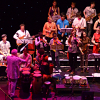
Grand Union Orchestra
band / ensemble / orchestra
Tony Haynes
composer / conductor1941 - 2024
 Michel Legrand
Michel Legrand Legrand Jazz
Columbia
1958
Strictly speaking, Michel Legrand's Legrand Jazz is not overlooked. It is lauded whenever it is mentioned. But fewer people seem to have actually heard the album than have merely heard of it. The composer of many fine film soundtracks, Legrand here shows himself to be a master of jazz big-band arranging, too. The eleven tracks are all familiar jazz standards—from

Fats Waller
piano1904 - 1943

Django Reinhardt
guitar1910 - 1953

Dizzy Gillespie
trumpet1917 - 1993

Duke Ellington
piano1899 - 1974

Thelonious Monk
piano1917 - 1982

Bix Beiderbecke
cornet1903 - 1931

Miles Davis
trumpet1926 - 1991

Bill Evans
piano1929 - 1980

Ben Webster
saxophone, tenor1909 - 1973

John Coltrane
saxophone1926 - 1967

John Lewis
piano1920 - 2001

Herbie Mann
flute1930 - 2003
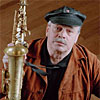
Phil Woods
saxophone, alto1931 - 2015

Art Farmer
flugelhorn1928 - 1999

Frank Rehak
trombone1926 - 1987

Ernie Royal
trumpet1921 - 1983

Teo Macero
producer1925 - 2008
 Nicola Conte
Nicola Conte Other Directions
Blue Note
2004
Nicola Conte is best known for his early acid-jazz work, in particular his genre-defining masterpiece, Jet Sounds (Schema, 2000), and his post-2010 spiritual jazz albums. Other Directions is the most straight-ahead of his discs. Conte has said that it is his tribute to Horace Silver, John Coltrane, Miles Davis,

Cannonball Adderley
saxophone1928 - 1975
Kenny Clarke-Francy Boland Big Band
band / ensemble / orchestra
Yusef Lateef
woodwinds1920 - 2013

Rosario Giuliani
saxophone, alto
Gaetano Partipilo
saxophone, altob.1974
Daniele Scannapieco
saxophone, tenor
Fabrizio Bosso
trumpet
Gianluca Petrella
tromboneb.1975

John Dankworth
saxophone1927 - 2010

Krzysztof Komeda
piano1931 - 1969
 Alessandro Meroli
Alessandro Meroli Notturni
Space Echo
2021
Jazz has an impressive track record for film scores. But curiously, given the many movie masterpieces shot by Italian directors, the country has produced few jazz-based soundtracks of note. Saxophonist and composer Alessandro Meroli's Notturni would certainly qualify except for one thing: there is no film. It is, however, an audio album crying out to be a soundtrack. Ideally this would be a visual tone poem along the lines of director Godfrey Reggio's collaboration with

Philip Glass
composer / conductorb.1937

Albert Ayler
saxophone, tenor1936 - 1970

Ravi Shankar
sitar1920 - 2012
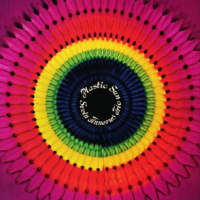 Svein Finnerud
Svein FinnerudPlastic Sun
Sonet
1970
From the early years of Norwegian jazz, few albums have stood the test of time as well as the synchronously psychedelic Plastic Sun. It was the second release from the Svein Finnerud Trio—pianist Finnerud, bassist Bj?rnar Andresen and drummer
Espen Rud
drums
Jan Garbarek
saxophoneb.1947

Arild Andersen
bass, acousticb.1945

Terje Rypdal
guitarb.1947
 "
data-original-title="" title="">Manfred Eicher's label hit its stride, Finnerud was more involved with painting than with music. Plastic Sun spans a broad stylistic range, from funk and gospel-infused interludes through proto-ambient meditations and turbocharged collective-improvisations. It is an acoustic album, but the soundscape is rich in timbral invention, and engineer Egil Eide, working with limited technical resources by 2022 standards, was key to crafting the psychedelic vibe. In interviews, Finnerud acknowledged the formative influence of
"
data-original-title="" title="">Manfred Eicher's label hit its stride, Finnerud was more involved with painting than with music. Plastic Sun spans a broad stylistic range, from funk and gospel-infused interludes through proto-ambient meditations and turbocharged collective-improvisations. It is an acoustic album, but the soundscape is rich in timbral invention, and engineer Egil Eide, working with limited technical resources by 2022 standards, was key to crafting the psychedelic vibe. In interviews, Finnerud acknowledged the formative influence of 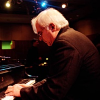
Paul Bley
piano1932 - 2016

Annette Peacock
vocals
Ornette Coleman
saxophone, alto1930 - 2015
 George Coleman
George Coleman Amsterdam After Dark
Timeless
1979
"That lovely, lovely sound,"

Stan Getz
saxophone, tenor1927 - 1991

Hilton Ruiz
piano1952 - 2006

Sam Jones
bass, acoustic1924 - 1981

Billy Higgins
drums1936 - 2001
 Ilaria Capalbo
Ilaria Capalbo Karthago
Bluenord
2022
At the time of writing in spring 2022, bassist and composer Ilaria Capalbo's Karthago has barely been out long enough to qualify as overlooked. But while the album is making a dent in Europe, the chances are it lacks the distribution necessary to follow suit in North America. Born and brought up in Italy, since 2020 Capalbo has spent much of her time in Sweden, where she recorded Karthago. The album was inspired by the ancient city of Carthage, which during the age of the Roman Empire was situated in what is now Tunisia. The city is said to have been founded, unusually, by a woman and was destroyed by a Roman army in 146 BC. Enough history. The album is in effect a suite, composed and arranged by Capalbo for a quintet, which is expanded on the opening track only to a septet. The music is elegiac and sometimes poignant, but never mournful and always lyrical and shimmeringly beautiful. There are occasional solos but they are brief; the emphasis throughout is on group playing, which moves seamlessly back and forth between arranged and improvised sections, both of which feature high degrees of counterpoint and collective interaction. Alongside Capalbo, alto saxophonist and clarinetist

Thomas Backman
saxophone, baritoneFredrik Nordstrom
saxophone, tenorAndreas Hourdakis
guitarFredrik Rundqvist
drumsTags
Comments
PREVIOUS / NEXT
Support All About Jazz
 All About Jazz has been a pillar of jazz since 1995, championing it as an art form and, more importantly, supporting the musicians who make it. Our enduring commitment has made "AAJ" one of the most culturally important websites of its kind, read by hundreds of thousands of fans, musicians and industry figures every month.
All About Jazz has been a pillar of jazz since 1995, championing it as an art form and, more importantly, supporting the musicians who make it. Our enduring commitment has made "AAJ" one of the most culturally important websites of its kind, read by hundreds of thousands of fans, musicians and industry figures every month.





 Buy Now
Buy Now



